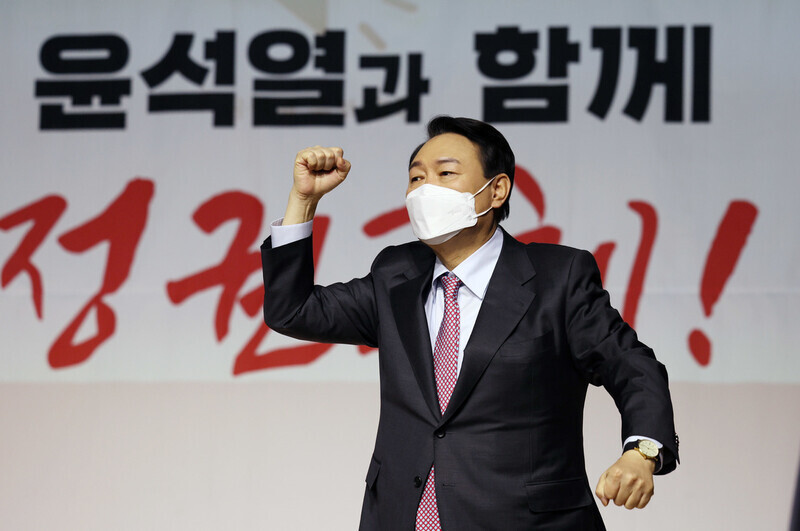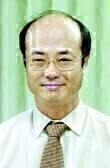hankyoreh
Links to other country sites 다른 나라 사이트 링크
[Column] A Yoon victory would be a victory for the establishment


Since the establishment of the government of the Republic of Korea in 1948, the history of Korean politics can be divided into two periods: the period of the dictatorships of Syngman Rhee, Park Chung-hee and Chun Doo-hwan and subsequent period of presidents who served single five-year terms.
Following a revision to Korea’s Constitution in 1987 that required presidents to be elected directly, there have been seven presidents: Roh Tae-woo, Kim Young-sam, Kim Dae-jung, Roh Moo-hyun, Lee Myung-bak, Park Geun-hye, and Moon Jae-in. Korea’s eighth five-year single-term president will be elected on March 9.
What is the political significance of this year’s presidential election? Readers are no doubt curious whether Lee Jae-myung or Yoon Suk-yeol will end up in the Blue House. Many also wonder whether Ahn Cheol-soo will finish the race or will team up with Yoon. Another big question is how much of the vote candidates from minor parties like Sim Sang-jung and Kim Dong-yeon will receive.
But we need to put aside our curiosity for a moment and zoom out to review the history of presidential elections in Korea. In the democratic republic of South Korea, the first time a peaceful transfer of power occurred through an election was in 1997, 49 years after the government was established. That’s truly a shameful history.
Why did that come so late? For a long time, there were forces that prevented a change of government — the regimes of Park Chung-hee and Chun Doo-hwan, who came to power through military coups in 1961 and 1980, along with the vested interests of capital and the national security establishment, which increased their power by pandering to Park and Chun.
Their ideology consisted of anti-communism and conservatism. Regionally, they were centered on Yeongnam in the southwest; economically, they were oriented on growth and market. Their vanguard consisted of the conservative parties and conservative newspapers. They called themselves the “mainstream,” but in reality, they were just the establishment.
These groups were always wary of Kim Dae-jung, who hailed from Honam in the southwest. Even in their off-hours, they would mutter that Kim mustn’t be allowed to become president. They knew that the election of a man who symbolized the periphery of Korean society would mean the loss of their power.
The transfer of power in 1997 was almost a miracle. In 2001, the Kim Dae-jung administration carried out a tax audit on all the media outlets. One after another, media owners who had been called “nighttime presidents” made the mortifying trip to jail. Kim hoped that those audits would break the illicit ties between the press and politics.
But the conservative newspaper owners regarded this as political retaliation. Since then, those newspapers have mounted ideological and political offensives against the administrations of Kim Dae-jung, Roh Moo-hyun, and Moon Jae-in, all but heaping curses upon them.
It was in the same vein that the conservative establishment couldn’t bear to see Roh Moo-hyun elected president in 2002. Ahead of the 2004 general election, the Grand National Party — which held a majority in the National Assembly — impeached Roh, with the conservative press egging it on. But in the resulting backlash, the party lost control of the National Assembly.
The resounding victory of Lee Myung-bak in 2007 meant the revival of the conservative establishment and the Democratic Party’s fall from power. Roh’s former associates lamented their banishment to the political wilderness. The conservative establishment ought to have left Roh alone, but it couldn’t suppress its scorn for the powerless outgoing president.
Subsequent events showed the conservative establishment reaping what it had sown. It was no coincidence that Roh’s chief of staff — Moon Jae-in — went on to become president.
Ahead of the 2017 presidential election, President Moon Jae-in said he wanted to “change the mainstream” of South Korea’s politics. He wasn’t successful in this endeavor, but why? Simply put, his failure seems to have resulted from naivety.
There have been multiple mistakes or miscalculations on Moon’s part. For one, he shouldn’t have appointed Yoon Suk-yeol, a firm believer in the authority of the prosecution service, as prosecutor general. For another, he shouldn’t have insisted on naming Cho Kuk the minister of justice. While there’s no point in crying over spilled milk, those mistakes deserve scrutiny.
What is the prosecution service, after all, but an institution of law enforcement and a pillar of the establishment?
Roh Tae-woo filled important positions in his administration with prosecutors. Both his chief of staff, Jeong Hae-chang, and his spymaster, Seo Dong-gwon, were former prosecutors. Jeong Gu-yeong, senior secretary for civil affairs at the Blue House, would later serve as prosecutor general. The Roh Tae-woo administration was nearly a prosecutorial republic.
What would the election of former prosecutor general Yoon Suk-yeol mean for the history of Korea? First, it would mean the completion of the prosecutorial republic. No further explanation should be needed here.
Second, it would be the glorious return of big business and the security establishment. That’s evidenced by numerous remarks that Yoon has made in the service of their interests.
Korea’s conservatives haven’t learned their lesson from their decades-long cycle of boom and bust. They haven’t evolved into “reform conservatives” or “rational conservatives.” They haven't managed to produce a decent presidential candidate, and the result is Yoon Suk-yeol. Sometimes I wonder if they have any shame at all.
In a democracy, administrations that do a bad job have to face the consequences. Given the poor governance of the Moon administration, there’s plenty of reason to argue that a different party should be given a turn at the helm.
But will the Korean public tolerate the return of the capitalists, defense hawks and fake conservatives who are cynically making that argument? What should voters do?
Please direct questions or comments to [english@hani.co.kr]

Editorial・opinion
![[Editorial] Penalties for airing allegations against Korea’s first lady endanger free press [Editorial] Penalties for airing allegations against Korea’s first lady endanger free press](https://flexible.img.hani.co.kr/flexible/normal/500/300/imgdb/original/2024/0502/1817146398095106.jpg) [Editorial] Penalties for airing allegations against Korea’s first lady endanger free press
[Editorial] Penalties for airing allegations against Korea’s first lady endanger free press![[Editorial] Yoon must halt procurement of SM-3 interceptor missiles [Editorial] Yoon must halt procurement of SM-3 interceptor missiles](https://flexible.img.hani.co.kr/flexible/normal/500/300/imgdb/child/2024/0501/17145495551605_1717145495195344.jpg) [Editorial] Yoon must halt procurement of SM-3 interceptor missiles
[Editorial] Yoon must halt procurement of SM-3 interceptor missiles- [Guest essay] Maybe Korea’s rapid population decline is an opportunity, not a crisis
- [Column] Can Yoon steer diplomacy with Russia, China back on track?
- [Column] Season 2 of special prosecutor probe may be coming to Korea soon
- [Column] Park Geun-hye déjà vu in Yoon Suk-yeol
- [Editorial] New weight of N. Korea’s nuclear threats makes dialogue all the more urgent
- [Guest essay] The real reason Korea’s new right wants to dub Rhee a founding father
- [Column] ‘Choson’: Is it time we start referring to N. Korea in its own terms?
- [Editorial] Japan’s rewriting of history with Korea has gone too far
Most viewed articles
- 160% of young Koreans see no need to have kids after marriage
- 2Presidential office warns of veto in response to opposition passing special counsel probe act
- 3S. Korea “monitoring developments” after report of secret Chinese police station in Seoul
- 4Months and months of overdue wages are pushing migrant workers in Korea into debt
- 5Hybe-Ador dispute shines light on pervasive issues behind K-pop’s tidy facade
- 6[Editorial] Penalties for airing allegations against Korea’s first lady endanger free press
- 7OECD upgrades Korea’s growth forecast from 2.2% to 2.6%
- 8Inside the law for a special counsel probe over a Korean Marine’s death
- 9Japan says it’s not pressuring Naver to sell Line, but Korean insiders say otherwise
- 10[Exclusive] Hanshin University deported 22 Uzbeks in manner that felt like abduction, students say